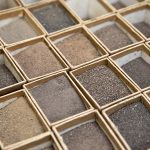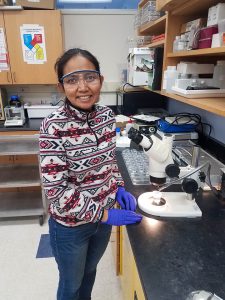
Nina Desianti working in the WSLH Environmental Toxicology Lab.
As an undergraduate, Nina Desianti became fascinated with diatoms – microscopic single-celled algae with cells walls constructed of silica that live in aquatic environments. Their shapes, their colors, their sizes, and what they can tell us about our environment (past, present and future) – it all captivated Nina’s imagination.
Before joining the WSLH Environmental Toxicology section three years ago, Nina spent several years at the Academy of Natural Sciences of Drexel University in Philadelphia, which has the second largest diatom collection in the world. One of her research projects with curator Marina Potapova assisting the State of New Jersey on coastline restoration is recounted in this Hakai magazine article – Philadelphia’s Diatom Archive Is a Way, Way, Wayback Machine
In the following Q&A Nina talks more about diatoms, what is was like working with centuries of history at the Academy of Natural Sciences, and how her diatom expertise is now helping Wisconsin’s environment.
When did you first become interested in diatoms and what made you interested in them?
My introduction to diatoms was when I took Protists’ Biology class as an undergraduate at Diponegoro University in Indonesia. I was fascinated by their diversity, their various shapes, and sizes. They look more beautiful under a high magnification microscope, which shows the intricate and striking patterns of their cell walls. Each diatom species has a unique shape and cell wall ornamentations, and it makes you feel that you want to collect and catalog them.
When did you start working with Dr. Potapova? Were you a graduate student at Drexel University? How long did you work as her research assistant?
I joined Dr. Potapova’s lab in 2013 as a graduate student and I worked as a research assistant at her lab for seven years, where I learned more about coastal wetland diatoms, the diatoms that are found in estuarine habitats.
What was it like to work at the Academy of Natural Sciences with the diatom herbarium and centuries of history? How old were the oldest diatoms in the herbarium?
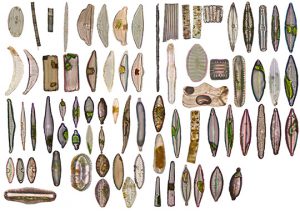
Diatoms Isolation on white background. (Shutterstock)
The Academy of Natural Sciences in Philadelphia hosted one of the largest diatom herbariums in the world and is equipped with great facilities, a state-of-the-art microscope, and the best library for literature on diatom research. It was a great opportunity to be able to work there. I had access to the special collections – types of specimens of diatoms described hundreds of years ago, with the oldest slide dated back to 1808 – and access to rare books or literature on diatoms. Everything is in one place – it’s the ideal place to study diatoms. Many scientists who study diatoms have visited the Academy of Natural Science and sometimes they spend more time there to study a particular species that they are interested in.
The oldest diatoms in the herbarium would be diatoms described from the Late Miocene to the early Pliocene, millions of years ago. In 1985, Mark Whiting and Hans Schrader studied the deposits of fossil marine diatoms in the Pacific Northwest and described a couple of species of diatoms, and they deposited the diatom type slides at the Academy of Natural Sciences.
Do you know if New Jersey has started acting on what you and Dr. Potapova found in your research?
I think New Jersey is continuing its effort in protecting its estuaries and salt marshes, and building partnerships with federal organizations, universities, private organizations, and the communities of the New Jersey coastal areas to work together to help restore, protect, and enhance the water quality and natural resources of the New Jersey estuaries and its watershed. In fact, the New Jersey Department of Environmental Protection continues to collaborate with our lab on a research project on the reconstruction of past environmental conditions of the New Jersey coastal wetlands using diatoms.
Are there many diatom researchers or is the field pretty small?
There are not a lot of diatom researchers; it’s a pretty small field.
How did you end up here at the WI State Lab of Hygiene? What interested you in working here?
In late 2019, the WI State Lab of Hygiene opened a position for an Environmental Health Specialist in the Environmental Toxicology department and they were looking for someone who can also identify diatoms, besides working in the Environmental Toxicology Lab. I applied for the job because I have experience with diatom analysis, and I am excited to learn more and gain skills in Environmental Toxicology. It is also an opportunity for me to study the diatom flora of Wisconsin.
How are you using diatoms here in Wisconsin? What can diatoms tell us about Wisconsin’s environment?
I collaborate with the Wisconsin Department of Natural Resources (WDNR) to refine the established Diatom Phosphorus Index (DPI), a diatom-based model to estimate nutrient pollution in streams and rivers, particularly phosphorus. DPI employs a statistical technique on a suite of diatom species composition and total phosphorus (TP) datasets collected from streams and rivers across Wisconsin. DPI is an effective way to assess water quality and monitor the phosphorus level in streams and waters since it can tell if there is chronic nutrient pollution.
The implementation of DPI will help us to decide if restoration work is needed in impacted areas. From the pilot study alone, we can detect areas impacted by erosion and high levels of phosphorus based on the diatom community. There is a diatom species composition shift when we compare the diatom community in the Northern Lakes and Forest area to the area where there are more agricultural activities.
Anything else you’d like folks to know about diatoms or your research?
In the process of studying the diatom flora of Wisconsin, my collaborator Gina LaLiberte from WDNR and I established a new combination of diatom species and we published it in a paper last March.
Diatom science is a fertile field; there are more species to be found in our backyard! And don’t forget to thank the diatoms since they produce 20-30% of the air we breathe!



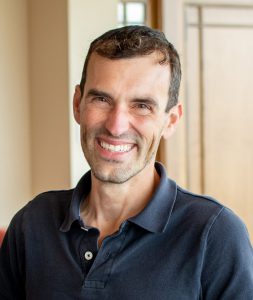 WSLH
WSLH 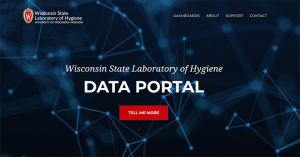
 WSLH
WSLH 